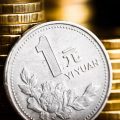
China's lightning-fast recovery from the pandemic has reignited the debate over how long it can lastpersist50 years of dollar dominance in world markets.
The difficulties the United States has in tryingto control the situation with coronavirus and at the same time to revive the state economy, is in sharp contrast to the success of the Asian country, showing the return of growth in its economic indicators.
While the yuan is gaining ground, the greenThe currency is showing the worst performance since 2017, and this discrepancy speaks of an intensification of China's struggle against the hegemony of the dollar - investors rush to onshore assets, try to use the yuan for trading and even regard it as a reserve currency.
Of course, the decline of the dollar as a global reservecurrency in one way or another has been forecast for many years. Before the yuan, the buzz over the dollar's successor centered around the euro. However, nothing has been able to break the dual power underlying the dollar's dominance: the US's role as an engine of global economic growth and as the most popular haven for investors in times of crisis. These two pillars were so fragile that they were aptly nicknamed "dollar smile" in trade circles.
But lately this smile lookstense, because the virus has undermined both traditionally strong sides of the currency. Instead, the yuan is benefiting, thanks to demand for cutting-edge economic performance and pandemic-untouched assets, bringing the long-term outlook for the Chinese currency back into focus.
"The center of the world economy is shifting from the North Atlantic, where it has been for 500 years, to the countries of the Pacific region.And over time, the foreign exchange markets will reflect this situation."- said Mark Chandler, chief market strategist at Bannockburn Global Forex.
Yuan smile
President Donald Trump's aspirations forthe weakening of the dollar had rather ironic consequences for his country. The American side often accused Beijing of deliberately containing the yuan to support Chinese exports at the expense of the United States and even launched a full-scale trade war to speed up its own economic development, but because of the pandemic, the balance of power has changed dramatically.
"In this situation, China is reaping the benefits.Now the world's second-largest economy candethrone the United States as the locomotive of the world economy in 2028, for five yearsearlier than expected in last year's forecast, because objectively China has weathered the pandemic better."- wrote last month at the Indiana Center for Economic and Business Research in the United States.
While the United States plans to restore the pre-crisisproduction volumes in 2021, showing an increase of 3.9%, China is laying down GDP growth of more than 8%. In addition, the Asian country's central bank is considering tightening monetary policy, in contrast to the promises of the US Federal Reserve to maintain stimulus measures that weaken the dollar.
In fact, China's economic success is seenprecisely because it has become the main link in the global supply chain, which reinforces the global trend towards lower interest rates and increases divergence.
"As the U.S. and other countries try to control the pandemic while waiting for vaccinations to begin, they continue to rely on the supply chain created by China.It is this advantage that forces the central banks of the Big Ten (G-10) countries to pursue an accommodative policy."- said Ben Emons, director of macro strategy at Medley Global Advisors.
He who pays calls the tune
Investors have certainly turned their attention toChinese bonds. According to Bloomberg data, from October 2018 to September 30, 2019, that is, in 12 months, they invested $ 135 billion in them.The shares also turned out to be popular - during the same period they raised $ 155 billion. The recent NYSE exclusion of several Chinese companies served as a reminder of the regulatory and trading risks associated with the Asian nation's assets, and investors were generally calm.
Ultimately, it is a record number ofassets with negative yields in other parts of the world made Chinese debt especially attractive. China's 10-year bonds yield more than 3%, while US Treasuries with a similar maturity offer just over 1%. As these securities are also accounted for in a growing number of international benchmarks that help investors set their yield targets, the renminbi is re-emerging as a currency for both short-term and long-term obligations.
Expanding influence
Despite the fact that for twoFor decades, more than 60% of the world's foreign exchange reserves were denominated in dollars, at the end of the third quarter of 2020, the reserves of this currency fell to their lowest level since 1996. The euro, pound and yen have benefited from this decline, and yet only the yuan has increased reserves - up 2.1% over the past three quarters.
This has led some analysts to reconsideryour approach to currency. HSBC Holdings Plc, the largest bank in the UK, believes that the yuan is having an increasing influence on weekly changes in prices for the pound and commodity currencies, while strategists from Societe Generale SA also say that the Chinese currency affects the appetite for risk.
The yuan is currently fifth inpopularity as a currency for global payments, it accounts for about 2% of transactions, according to the International Interbank Information Transfer and Payment System (SWIFT), which processes international payment messages for more than 11,000 financial institutions in 200 countries. This is still a small proportion, however, when Swift first started tracking currencies in this way in 2010, the yuan was only in 35th place.
Intervention risk
Of course, the insane passion of investors for everything,related to China, should be accompanied by a serious warning - these flows can push the yuan to strengthen too strong, too fast, which will force the PRC government to intervene to stop the growth of the currency, so as not to harm exports. Statesmen have historically advocated a weaker currency to support producers.
Indeed, Citigroup Inc. predicts that in 2021, compared to the dollar, the Chinese currency couldgrow to its highest level in nearly three decades.At Goldman Sachs Group Inc.JPMorgan Chase & Co.describes the yuan bet as one of its "most compelling" options for investors this year.
The offshore yuan (CNH) is up 0.2% to hit 6.4571 a dollar as of 7:26 am New York time last Friday.
This is not the first time the state has triedcontain the growth of the exchange rate. In 2015, Beijing unexpectedly devalued its currency, resulting in the largest daily decline in the yuan in 20 years. So far, China's central bank has only slowed, rather than halted, the yuan's rally, making it cheaper for traders to short the currency and loosened restrictions on capital flows to allow more outflows.
But if the currency rises to less desirablelevel, politicians can take more stringent measures. They may also delay the opening of domestic markets - a prerequisite for the renminbi to become a truly global currency.
"At the local level, the momentum in the foreign exchange market suggests a slower pace of renminbi appreciation"Nomura strategists, including Craig Chan, said in their December 2020 report.
Game for the future
Any intervention will slow down not only the growth of the yuan,but also its rivalry with the dollar. Despite optimistic forecasts for the yuan from a number of the largest companies in the financial industry, the average forecast foresees an increase in the currency rate in 2021 by less than 1%. For comparison, according to Bloomberg data, the expected growth of the ruble is more than 3%, the Brazilian real - more than 6%.
The dollar hegemony idea may also find an allyrepresented by former Fed Chairman Janet Yellen, who will be appointed by President-elect Joe Biden as head of the US Treasury. The new administration could reinvigorate the stronger dollar thesis by restarting policies that have been in place since 1995, which came to naught during the Trump presidency.
However, a surge in appetite for Chineseassets are a sign of growing international satisfaction with the yuan, and the country's strong economic performance is likely to stimulate its continued use, even if the dollar remains the dominant currency for trade, capital markets and reserves over the next few years.
"We are extremely bullish on emerging markets, and this is mainly based on the view that in 2021 the Chinese economy will bestrong and that China has already done a great job of fighting the virus.The pressure for the yuan to strengthen will continue."Commented John Malloy, portfolio manager and co-leader of the $ 10 billion Emerging and Frontier Markets team at RWC Partners.

5
/
5
(
1
voice
)





